|
 Secure Site
Secure Site
|
 |
Archive for the 'Sleep Habits' Category
 How to Choose the Best Alarm Clock, get the Gradual Chime Clock Your body is a temple, so why not wake it respectfully and naturally with the gentle Tibetan bell-like chimes of the Zen alarm clock.
Gradually increasing over a 10-minute period, the chimes help ease you out of sleep and into your day. Not just for waking, the rhythm of the chimes is ideal for use during meditation and affirmation, as well as serving as a subtle signal for meeting times. The simple wood shape and lovely Japanese leaf-embellished dial will bring balance and beauty to either bedrooms or offices.
The Zen Alarm Clocks are decorative, highly functional (as both alarm clocks and timers for yoga and meditation), and environmentally friendly.
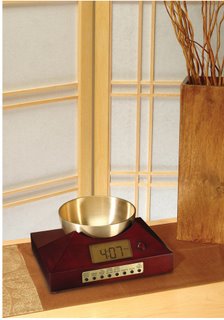 Tibetan-Bowl Gong Alarm Clocks with Natural, Acoustic Sounds Now & Zen Headquarter Store
1638 Pearl Street
Boulder, CO 80302
(800) 779-6383
Posted in Natural Awakening, Now & Zen Alarm Clocks, sleep, Sleep Habits
 Awaken gradually Dreaming of a Good Night’s Rest
How you awaken each morning can also influence how well you sleep. Some experts believe your body is naturally designed to awaken gradually with the rising sun and should not to be jarred awake by a screaming alarm clock. Dawn simulators recreate a natural sunrise by slowly increasing the intensity of light in the room. A study in BMC Psychiatry found that dawn simulators improved the quality of sleep during winter months for a group of about 80 randomly chosen people.
The right light can also help you fall asleep more easily. Studies have shown that exposure to 2,000- to 10,000-lux light (the equivalent of gazing at the horizon on a sunny day and up to 20 times brighter than normal room lighting) can improve overall sleep quality, says psychiatrist Daniel Kripke, MD, of the University of California, San Diego. This is most beneficial for about 20 to 30 minutes in the morning and a few hours prior to bed. More specifically, light therapy has been used to reset body clocks for those with sleep-timing problems and to correct erratic sleep habits caused by depression. A recent study in the journal Sleep found that evening exposure from a light box effectively treated people who often woke up too early and were unable to fall back to sleep. Exactly how light therapy improves sleep for people with depression remains unknown, Kripke says, but one popular theory is that bright light increases sleep-aiding serotonin levels.
Now & Zen’s Digital Zen Clock’s long-resonating Tibetan bell-like chime makes waking up a beautiful experience – its progressive chimes begin your day with grace. When the clock’s alarm is triggered, the acoustic chime bar is struck just once … 3-1/2 minutes later it strikes again … chime strikes become more frequent over 10 minutes … eventually striking every 5 seconds until shut off. As they become more frequent, the gentle chimes will always wake you up – your body really doesn’t need to be awakened harshly, with a Zen Clock you’re awakened more gradually and thus more naturally. Unlike artificial recorded sounds coming out of a tiny speaker in a plastic box, natural acoustic sounds transform your bedroom or office environment.
adapted from Natural Solutions Magazine, December 2005 by Matthew Sloan
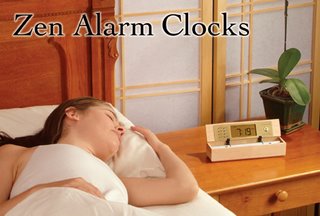 Natural Awakening, Digital Zen Alarm Clock Now & Zen’s Chime Alarm Clock Shop
1638 Pearl Street
Boulder, CO 80302
(800) 779-6383
Posted in Chime Alarm Clocks, Japanese Inspired Zen Clocks, Natural Awakening, Now & Zen Alarm Clocks, Progressive Awakening, sleep, Sleep Habits, wake up alarm clock, Well-being
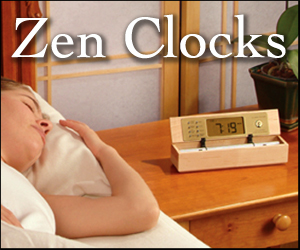 musical chime and gong alarm clocks by Now & Zen, Inc. Set Time Aside to Sleep!
Changing Your Life and Your Alarm Clock: Getting More Sleep Can Improve Your Health
By LARA SALAHI (@larasalahi1) and CHRISTINE BROZYNA
Amid the hustle of every day stress, there are some simple steps people can take to get a better night’s sleep.
“You need to set aside the time for sleep. You need a few hours to unwind before. It takes time for the brain to wind down,” said Dr. Charles Czeisler, professor of sleep medicine at Harvard Medical School.
At Northside Hospital Sleep Disorders Center Roberts was taught “sleep hygiene,” — a healthy routine that should be practiced before bed.
Also, choosing the right alarm clock can make all the difference in the world. The Zen Alarm Clocks with chimes is the perfect, peaceful solution. Invest in gentle and relaxing sleep tools like The Zen Alarm Clock or The Zen Timepiece with Tibetan-bowl gong!
 gong alarm clocks offer alternatives to jarring, loud alarm clocks Now & Zen Headquarter Store
1638 Pearl Street
Boulder, CO 80302
(800) 779-6383
Posted in Bamboo Chime Clocks, sleep, Sleep Habits
 Katsushika Hokusai Ukiyo-e, Japanese Iris There’s a good reason that people say you should “sleep on it” when facing a tough problem—it helps! A new study suggests dreaming is beneficial for problem solving. Psychology Today reports, “In REM sleep, cortical activation spreads from whatever one’s been pondering to marshal associated ideas, thanks to changes in levels of the neurotransmitters norepinephrine and acetylcholine.” Jasper Johns, Jack Nicklaus and many others have credited their dreams for successful ideas. A co-author of the study adds: “So many times, we already have the solution somewhere in our brain. It just needs an extra ‘boost’ before it can be accessed.”
adapted from Psychology Today by Elizabeth Ryan, October 2009
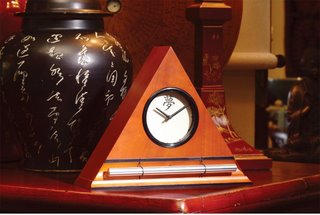 Zen Alarm Clock Now & Zen’s Alarm Clock Headquarter Store
1638 Pearl Street
Boulder, CO 80302
(800) 779-6383
Posted in Bamboo Chime Clocks, Chime Alarm Clocks, Japanese Inspired Zen Clocks, Natural Awakening, Now & Zen Alarm Clocks, Sleep Habits, Ukiyo-e, Well-being
 sleep for well-being A good night’s rest can help you lose weight, beat depression, and ward off heart disease.
PEOPLE THINK sleep is a waste of time,” says James P. Krainson, M.D., director of the South Florida Sleep Diagnostic Center in Miami. “But they don’t realize that sleep will make them more productive.” It will also help you improve your memory, shed postpregnancy pounds, and stave off obesity, heart disease and diabetes. Dozens of studies support the notion that sleep is just as important for maintaining good health as diet and exercise. For example, a study published in the journal Sleep found a relationship between short sleep and increased diabetes risk. Other studies found a lack of sleep can exacerbate pain, cause mood disturbances, and even increase the risk of gum disease.
Your wake–up call
If results from a 2007 Sleep in America poll are anything to go by, too many women are risking their health from lack of sleep. Conducted by the National Sleep Foundation (NFS), last year’s poll revealed that 60 percent of American women get a good night’s sleep only a few nights per week or less. Apparently, when women are pressed for time–which, let’s face it, is every day—sleep is usually the first thing to go.
To help you get back in bed and waking up well rested we looked at two sleep ailments–and discovered some surprisingly effortless solutions.
THE PROBLEM: No time
Recent research at the University of Pennsylvania, published in 2007 in Sleep, says our work–driven culture keeps us from getting the rest we need. Among the findings: The more time we spend working and commuting, the less time we spend in bed. Even when we know that getting more sleep will make us feel better, it usually isn’t enough to keep us from burning the candle at both ends, says Michael Breus, Ph.D., sleep expert and author of Beauty Sleep: Look Younger, Lose Weight, and Feel Great Through Better Sleep (Plume, 2007). What’s required, Breus says, is a plan for making sleep a priority:
Set your clock for sleep
Set your Zen Alarm Clock with Chime to go off an hour before you want to go to sleep. The gentle Chime Alarm is your cue to start getting ready for bed.
Wind down for an hour Take 20 minutes to shut down the house for the night and prepare for the next morning. Spend the next 20 minutes doing your usual evening ablutions like washing your face, brushing your teeth, and changing into your pj’s. For the final 20 minutes, set your Meditation Timer with Chime for 20 minutes so that you can relax and meditate in bed. That’s it. No work, reading, e–mails, phone calls, paying bills, or getting into a discussion with your partner about your health, finances, or relationship during your power–down hour, says Breus. “Avoid any activity that gets your mind revved up before you go to bed,” he advises.
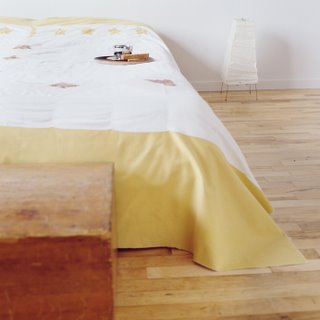 Create a Sleep Sanctuary Create a sleep sanctuary
“I’ve gone into bedrooms of people who say they can’t sleep, and they’ve got a computer in there, a TV, a huge pile of laundry on the floor,” says Breus. The question then becomes, according to Breus, not “Why can’t I sleep?” but “How could I sleep under these circumstances?” To transform your bedroom, Breus recommends moving the computer and the TV out of the room and clearing out the clutter. “You want to create an area that’s flowing and positiv; he writes in his book Beauty Sleep.
THE PROBLEM: Insomnia
Insomnia—from the Latin word for “sleepless” –is the most common sleep disorder, characterized by difficulty falling asleep, waking up in the middle of the night and not being able to fall back asleep, or waking up too early in the morning. For a clinical diagnosis, the lack of sleep must impair your daytime functioning, says Gregg D. Jacobs, Ph.D., sleep specialist at UMass Memorial Medical Center and founder of cbtforinsomnia.com. “Almost half of all adults have insomnia once a week,” he adds. But only a fraction of sufferers seek treatment, in large part, Jacobs says, “because they’re afraid their doctor will prescribe sleeping pills, and there is a growing belief that pills are not a good choice.” Try these drug–free solutions instead:
Retrain your brain for sleep
Cognitive behavior therapy (CBT) is a common psychological technique used to help people change the way they think and act and thereby break certain self–destructive habits. In two major studies in the Journal of the American Medical Association and one study in the Archives of Internal Medicine, cognitive behavior therapy proved to be more effective than sleeping pills, says Jacobs. “And unlike pills, CBT has no side effects and works long term.”
The CBT insomnia treatment program that Jacobs developed and tested at Harvard Medical School and UMass Medical Center (now online at cbtforinsomnia.com) involves five sessions over five weeks. It teaches insomniacs many techniques—like waking up at the same time every morning, including weekends; and when sleep doesn’t come within 30 minutes, getting up and doing something quiet and relaxing–that help people reform their sleep habits.
RESOURCES Check with the National Association of Cognitive– Behavioral Therapists Organization, nacbt.org, to find a practitioner.
Try melatonin
The same hormone that your body produces to induce drowsiness, melatonin, can be purchased overthe– counter in a pill form. Unlike valerian, “melatonin usually has an immediate effect,” says Wong.
BUYING GUIDE Look for Puritan’s Pride melatonin at puritan.com. DOSAGE Take 0.3 mg per day about 30 minutes to an hour before bedtime. “The recommendation on product bottles, 1 to 3 mg, is higher than many practitioners believe it should be,” says Wong. “There’s concern that too large a dosage could cause the body to reduce its own production of melatonin.”
 calming lavendar, aromatherapy for sleep Sniff lavender before bed
When 31 “healthy sleepers” aged 18 to 30 years in a Wesleyan University peer–reviewed study (published in 2005 in the journal Chronobiology International) sniffed lavender essential oil over the course of one half hour before bed, it increased the amount of time they spent in the most productive stages of sleep, and they reported feeling more rested the next day.
BUYING GUIDE Try Aura Cacia lavender oil at health food stores or natural markets or at auracacia.com.
DIRECTIONS “Put a few drops of lavender oil in a warm bath about an hour before bed,” suggests Wong. “A warm bath raises body temperature. When it falls after you get out, that drop causes you to feel drowsy.”
Boulder, Colorado—an innovative company has taken one of life’s most unpleasant experiences (being startled awake by your alarm clock early Monday morning), and transformed it into something to actually look forward to. “The Zen Alarm Clock,” uses soothing acoustic chimes that awaken users gently and gradually, making waking up a real pleasure.
 Gentle Chime Alarm Clock for a Progressive Awakening Rather than an artificial recorded sound played through a speaker, the Zen Clock features an alloy chime bar similar to a wind chime. When the clock’s alarm is triggered, its chime produces a long-resonating, beautiful acoustic tone reminiscent of a temple gong. Then, as the ring tone gradually fades away, the clock remains silent until it automatically strikes again three minutes later. The frequency of the chime strikes gradually increase over ten-minutes, eventually striking every five seconds, so they are guaranteed to wake up even the heaviest sleeper. This gentle, ten-minute “progressive awakening” leaves users feeling less groggy, and even helps with dream recall.
adapted from Natural Health Magazine
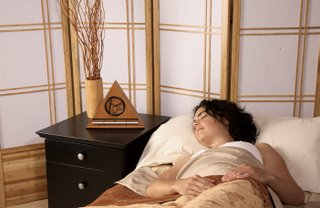 Wake up to the Zen Alarm Clock with Soothing Chime for a Progressive Awakening
Now & Zen’s Natural Chime Alarm Clock Shop
1638 Pearl Street
Boulder, CO 80302
(800) 779-6383
Posted in sleep, Sleep Habits, Well-being
 satisfy your spirit by creating a sleep oasis Create your sleep oasis with a mind/spirit component to satisfy your spirit. Discourage thoughts from continuing to churn at night by eliminating any sources of distraction, keeping work and stimulating entertainment (like TV and laptops) out of the bedroom. Rather than a thriller novel, grace the bedside with divinity: A small statue of the Buddha, Ganesha, Jesus, a revered saint, or other sacred figure can serve as a grounding, comforting presence, especially when paired with a natural element — a smooth stone, an acorn, a bowl of white sand. Alternatively, consider creating a bedside altar that honors the people you love, complete with small framed photographs and personal artifacts that reflect their spirit. With body, mind, and spirit thus cradled and protected, you can enter into sleep peaceful and complete.
Falling asleep is a natural progression into your body’s unconscious state. Using a Now & Zen alarm clock will progressively wake you up, mimicking your body’s natural waking process. Now & Zen alarm clocks come in a variety of styles to best compliment your sleep oasis.
Now & Zen Alarm Clocks adapted from Body + Soul Magazine, February 2006
 Alarm Clocks to Create a Sleep Oasis in Your Bedroom Now & Zen’s Clock Store
1638 Pearl Street
Boulder, CO 80302
(800) 779-6383
Posted in Natural Awakening, sleep, Sleep Habits, Well-being
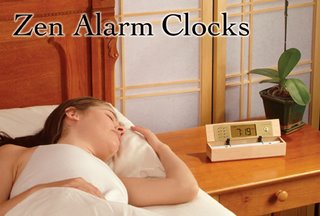 Sleep your way to a better health with The Zen Alarm Clock A good night’s rest can help you lose weight, beat depression, and ward off heart disease.
People think sleep is a waste of time,” says James P. Krainson, M.D., director of the South Florida Sleep Diagnostic Center in Miami. “But they don’t realize that sleep will make them more productive.” It will also help you improve your memory, shed postpregnancy pounds, and stave off obesity, heart disease, and diabetes. Dozens of studies support the notion that sleep is just as important for maintaining good health as diet and exercise. For example, a study published in the journal Sleep found a relationship between short sleep and increased diabetes risk. Other studies found a lack of sleep can exacerbate pain, cause mood disturbances, and even increase the risk of gum disease.
Your wake-up call. If results from a 2007 Sleep in America poll are anything to go by, too many women are risking their health from lack of sleep. Conducted by the National Sleep Foundation (NFS), last year’s poll revealed that 60 percent of American women get a good night’s sleep only a few nights per week or less. Apparently, when women are pressed for time—which, let’s face it, is every day—sleep is usually the first thing to go.
Take back the night. With health benefits that important, you can’t ignore those eight hours of shuteye any longer. To help you get back in bed and waking up well rested, we looked at four sleep ailments—and discovered some surprisingly effortless solutions.
THE PROBLEM: No time
Recent research at the University of Pennsylvania, published in 2007 in Sleep, says our work-driven culture keeps us from getting the rest we need. Among the findings: The more time we spend working and com- muting, the less time we spend in bed. Even when we know that get- ting more sleep will make us feel better, it usually isn’t enough to keep us from burning the candle at both ends, says Michael Breus, Ph.D., sleep expert and author of Beauty Sleep: Look Younger, Lose Weight, and Feel Great Through Better Sleep (Plume, 2007). What’s required, Breus says, is a plan for making sleep a priority:
Set your ZenAlarm Clock for sleep. Set your alarm to go off an hour before you want to go to sleep. The alarm is your cue to start getting ready for bed.
Wind down for an hour. Take 20 minutes to shut down the house for the night and prepare for the next morning. Spend the next 20 minutes doing your usual evening ablutions like washing your face, brushing your teeth, and changing into your pj’s. For the final 20 minutes, relax and meditate in bed. That’s it. No work, reading, e-mails, phone calls, paying bills, or getting into a discussion with your partner about your health, finances, or relationship during your power-down hour, says Breus. “Avoid any activity that gets your mind revved up before you go to bed,” he advises.
Create a sleep sanctuary. “I’ve gone into bedrooms of people who say they can’t sleep, and they’ve got a computer in there, a TV, a huge pile of laundry on the floor,” says Breus. The question then becomes, according to Breus, not “Why can’t I sleep?” but “How could I sleep under these circumstances?” To transform your bedroom, Breus recommends moving the computer and the TV out of the room and clearing out the clutter. “You want to create an area that’s flowing and positive,” he writes in his book Beauty Sleep.
Adapted from Natural Health Magazine, July 2010 by Susan Hayes
 Sleep your way to better health and wake up gently with a Zen Clock
Posted in Bamboo Chime Clocks, Chime Alarm Clocks, Goodness, Natural Awakening, Now & Zen Alarm Clocks, Sleep Habits
 Waking up in the morning should be as pleasant as falling asleep at night. The Zen Alarm Clock's gradual, gentle awakening is transformative. Kitagawa Utamaro Ukiyoe by YukiSakuma Close your eyes, breathe deeply, and envision the space where you feel the greatest sense of joy and calm. Is it a spare, expansive beach? A lush garden? A tranquil forest? More than likely, that’s your ideal bedroom.
“If the place you feel the most peaceful is in the mountains, then include things like a photograph of mountains, essential oils of fir or juniper in a diffuser, or a bowl of pine needles,” says feng shui teacher Denise Linn, author of Sacred Space. “You won’t be able to re-create the exact environment, but there are aspects you can incorporate.”
Reinventing your bedroom as a place of beauty and serenity sets up a lasting source of renewal and replenishment, both spiritual and physical. “The bedroom is the most important place in your home for enhancing your sense of well-being,” says Linn.
No need for an expensive, time-draining makeover. Here are 10 simple ways to create a dream bedroom that nurtures your health and refreshes your spirit.
1. Soften the Colors
Bedrooms are meant to be “yin rooms,” which facilitate passive, feminine spirit rather than generate active, masculine yang energy. “Yin rooms should be calm, so you can walk into them and relax,” says Susan Levitt, author of Taoist Feng Shui. She suggests painting walls in pastels such as lavender, beige, or off-white, or in muted flesh tones like cream, taupe, and rose.
Whatever hue you choose, make it nontoxic. Many paints contain volatile organic compounds, which produce hazardous fumes when wet and may continue to release those fumes for years after drying. Debra Lynn Dadd, author of Home Safe Home, recommends buying a water-based paint that’s low in VOCs. “Brand-name paint stores such as Sherwin-Williams and Benjamin Moore carry their own nontoxic paints,” says Dadd, who also suggests sleeping elsewhere for three or four days after painting a bedroom.
Another option is using Anna Sova Luxury Organics wall finish, manufactured with up to 99 percent food-grade ingredients (from $49 a gallon; annasova.com). To enhance the soothing effects of your new colors, add a bottle of Anna Sova’s Organic Aromatherapy formula ($12). Stirred into the wall finish before painting, these essential-oil-based blends scent your room with lemon, vanilla, orange and clove, or sandalwood.
2. Clear the Clutter
You needn’t sleep in a Zen den, but a clean, open space allows you to rest better at night. Throw out—or put away—items you haven’t read, worn, or looked at in a few years. “If you don’t love it and you haven’t used it in several years, get rid of it,” says Linn. “Reducing clutter is modern-day alchemy. Anything you don’t love only drags you down.”
And don’t try to hide the clutter under your bed—even if your frame has built-in drawers, store only bedding and pillows there, Levitt advises.
Bookworms may want to keep beloved novels at hand, but too many tomes can be overwhelming. Instead of having piles everywhere, keep one or two books out in your bedroom and store the rest on a book shelf, says Levitt. Don’t pack them too tightly; leaving a little free space gives you room to grow and symbolizes the acceptance of new things in your life.
3. Purify Your Pillows
One of the best ways to purify your sleeping space is also the cheapest: Replace your current pillow with an organic cotton or wool pillow or cushion from Abundant Earth (abundantearth.com), Real Goods (realgoods.com), orRawganique.com. “Your nose is right there breathing in fumes from the foam,” says Dadd. “For less than $60, you can make a significant change in your health.” Wool offers additional benefits to allergy sufferers, since it’s naturally resistant to dust mites.
4. Tame the Decor
 The Zen Alarm Clock transforms mornings, awakening you gradually with a series of gentle acoustic chimes Once you use a Zen Clock nothing else will do Displaying photos of loved ones brings positive energy into a bedroom, as long as the wall decor is kept simple. “Don’t put up too many pictures,” says Levitt. “One per wall is plenty.” And avoid art with violent or chaotic imagery. “In feng shui, the first thing you see when you wake up is very important,” notes Linn. “If it’s a great piece of modern art, but the imagery is jagged, that’s not great for your energy.”
Some consultants advise against mirrors in the bedroom, but Levitt says they can open up the space. “Just make sure they’re not cracked, glazed, or tiled,” she adds. “Cracks show breakage and flaws; glaze doesn’t reflect clearly; and tiles break up your image, as though it’s hard to bring together different aspects of your personality.”
5. Dim the Lights
Street lamps and other outdoor lighting can wreak havoc on your sleep cycle because melatonin, the hormone that helps govern sleep, responds to light and darkness. For soundest snoozing, dim your bedroom at night with a thick, dark cotton canvas, and let in the morning sun when it’s time to wake; this will help you stay synchronized with your own body rhythms.
Lighting defines a room’s aesthetics as well. Overhead lights lack atmosphere, so install a dimmer switch or use small lamps. “Overhead lighting doesn’t belong in the bedroom,” says Dadd. “I prefer gentle lighting that puts you in an inward-looking frame of mind.”
6. Send In the Scents
Filling the air with a luscious yet subtle fragrance makes your bedroom nearly spa-like. Linn suggests adding a few drops of calming essential oil like neroli, rose, or jasmine to an aromatherapy diffuser (available from Aura Cacia for $15; frontiercoop.com), while Levitt recommends chamomile, lavender, or clary sage.
7. Clear the Air
Keeping your windows open works wonders toward purifying indoor air of dust, mold, pet dander, and chemicals from household cleaners. “Fresh outdoor air is essential for good health,” says Dadd.
Once winter rolls around, however, letting in that oh-so-cold fresh air may not seem as appealing. “But even if you crack open your window just an inch, it can help,” says building biologist Athena Thompson, author of Homes That Heal. “If you have one or two people sleeping in a closed room for eight hours, it depletes the air of oxygen and increases carbon dioxide, so you wake up feeling sluggish and headachy.” Add an extra blanket or two on chillier nights.
8. Power Down
Television picture tubes, wireless Internet connections, electrical wiring, and cellphones emit electromagnetic fields that may contribute to frequent waking, aches and pains, and muscle spasms, according to Lawrence Gust, a building biology consultant in San Marcos, Calif. To reduce your EMF load, remove electric cords and devices from the bedroom—or at least from within 8 to 10 feet of the bed—and disconnect Wi-Fi and multi-handset cordless phones.
“The time that you spend in your bedroom should allow for your body to be more connected with its own electromagnetic fields, rather than those coming from electronic devices,” says Dadd.
9. Modify the Mattress
“The bed is where you go to spend your key rejuvenating time—it’s where you wipe the slate clean,” Thompson says. But do you know what’s underneath you?
A typical foam mattress is made from petrochemical derivatives with fire retardants and other chemicals added, all of which can be absorbed through the skin. Thompson prefers mattresses made of organic cotton, pure grown wool, or natural rubber. Try Janice’s Superior Organic Cotton Mattress ($1,495 for queen-sized; janices.com) or Lifekind’s Natural Rubber Mattress ($1,595 queen;lifekind.com). If you’re not ready for such a major purchase, place a barrier cloth (available from Janice’s; queen-sized organic barrier, $269.95, or organic cover, $189.95) over your existing mattress. “It will give you a layer of natural fibers, which is more comfortable and helps you sleep better,” says Dadd.
10. Remake Your Bed
 Wake up with gradual, beautiful acoustic chimes. The Zen Alarm Clock transforms your mornings and gets you started right, with a progressive awakening When shopping for new bedding, look for 100 percent natural fibers–ideally organic cotton or organic hemp—at retailers like Gaiam (gaiam.com), Coyuchi (coyuchi.com), and Rawganique.com. To avoid chemically treated linens, make sure your purchases aren’t labeled “permanent press,” advises Dadd. “If you shop at stores like Bed, Bath & Beyond, the kinds of sheets that are untreated will be the jersey and flannel sheets,” she adds. For colors, opt for soothing shades like sage green and powder blue, says Levitt.
Even the purest fabrics expose you to chemicals if you launder them in perfumed detergents. “Commercial ‘fragrances’ represent anywhere from 10 to a few hundred chemicals, many of which have never been tested on humans,” says Thompson. “If you’re washing your bedding with fragranced detergents and drying them with fragranced dryer sheets every week, you’re going to be sleeping on another layer of chemicals all night.”
Clean your linens “the old-fashioned way, with baking soda or vinegar,” suggests Thompson. Or select detergents that are fragrance-free or have natural ingredients like orange peel.
Boulder, Colorado—an innovative company has taken one of life’s most unpleasant experiences (being startled awake by your alarm clock early Monday morning), and transformed it into something to actually look forward to. “The Zen Alarm Clock,” uses soothing acoustic chimes that awaken users gently and gradually, making waking up a real pleasure. Rather than an artificial recorded sound played through a speaker, the Zen Clock features an alloy chime bar similar to a wind chime. When the clock’s alarm is triggered, its chime produces a long-resonating, beautiful acoustic tone reminiscent of a temple gong. Then, as the ring tone gradually fades away, the clock remains silent until it automatically strikes again three minutes later. The frequency of the chime strikes gradually increase over ten-minutes, eventually striking every five seconds, so they are guaranteed to wake up even the heaviest sleeper. This gentle, ten-minute “progressive awakening” leaves users feeling less groggy, and even helps with dream recall.
adapted from Naturalhealthmag.com By Elizabeth Barker
 Wake up refreshed, love your alarm clock, transform your mornings with The Zen Alarm Clock's progressive awakening with gentle chimes. 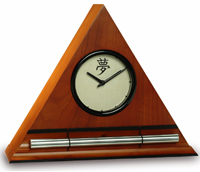 Wake up refreshed, love your alarm clock, transform your mornings with The Zen Alarm Clock's progressive awakening with gentle chimes. Now & Zen – Alarm Clocks with Gentle Sounds
1638 Pearl Street
Boulder, CO 80302
(800) 779-6383
orders@now-zen.com
Posted in sleep, Sleep Habits
 Waking up in the morning should be as pleasant as falling asleep at night. The Zen Alarm Clock's gradual, gentle awakening is transformative. Feeling isolated and disconnected from the people around you may keep you from getting a good night’s sleep, even if you’re not aware of it, a small new study suggests.
People who feel lonely tend to experience more nighttime restlessness and disruptions than their better-adjusted peers, the study found, which may partly explain why loneliness has been associated with health problems such as high blood pressure, heart disease, anddepression, says lead researcher Lianne Kurina, PhD, an assistant professor of epidemiology at the University of Chicago.
“In lab experiments, when people are intentionally woken up repeatedly, it seems to have effects on [their] metabolism,” she says. “Their insulin sensitivity goes down, almost suggesting that poor sleep could put them at higher risk of type 2 diabetes, for example.”
In the new study, published today in the journal Sleep, the link between loneliness and sleep disruptions persisted even after the researchers took into account marital status and family size. This finding underscores an important distinction between loneliness and social isolation, Kurina says: The amount of loneliness people feel ultimately depends on how they perceive their social situation, not the situation per se.
“There can be people with lots of social connections that feel terribly alone, and conversely there are people with relatively small social networks who do just fine,” Kurina says. “Different people have different needs in terms of relationships—and it’s the space between what you want and what you have that can turn into loneliness.”
The 95 participants in the study all had strong social connections, as they were part of a close-knit, rural community in South Dakota. Yet even small differences in their degrees of loneliness had an impact on their sleep.
Kurina and her colleagues asked the participants how often they felt a lack of companionship, left out, or isolated from others, and they used these responses to rate the men and women on a standard loneliness scale. Then, for one week, the participants wore a wrist device to bed each night that records body movement and sleep disruption (known as an actigraph).
 Wake up with gradual, beautiful acoustic chimes. The Zen Alarm Clock transforms your mornings and gets you started right, with a progressive awakening Each one-point increase in the loneliness scale was associated with about an 8% increase in sleep disruptions and restlessness, the researchers found, even when they controlled for age, sex, body mass index, the breathing disorder known as sleep apnea, and negative emotions such as depression, anxiety, and stress.
Loneliness did not appear to influence sleep quality or daytime sleepiness, however, which suggests that the sleep disruptions were minor. More research will be needed to determine if these low-level disruptions can have effects on health similar to those seen in experiments when volunteers are woken up, but it seems plausible that comparable health consequences could occur, Kurina says.
It makes sense that someone who feels alone and vulnerable may wake more easily throughout the night, since early humans may have evolved this tendency to protect against potential threats, the study notes. Even now, Kurina says, short-term feelings of loneliness can be healthy because they can encourage humans to make social connections. Problems can arise, however, if loneliness becomes chronic.
“People who have been very lonely for a while start to expect rejection, to the point where it can become a self-fulfilling prophecy,” Kurina says. For this reason, she adds, it isn’t always helpful to tell someone who feels isolated and insecure to just make friends, get a pet, or go on more dates.
So what’s a lonely heart to do? Begin to rebuild social connections in an emotionally safe way, Kurina suggests. “Engage in situations where you’re not necessarily expecting people to give to you, but where you’re the one giving—like volunteering, or common-interest meetings like book groups,” she says. “Slowly you’ll begin to see the world—and see your relationships—in a more positive way.”
Wake up refreshed, love your alarm clock, transform your mornings with The Zen Alarm Clock’s progressive awakening with gentle chimes.
One of the ultimate Zen like experiences is waking-up from a great slumber refreshed and energized. Your mind and body are harmoniously one, both alert and focused. Having a refreshed mind and body are two keys to a natural and Zen lifestyle. Waking up in the morning should not be a loud and abrupt awakening, but rather it should be a peaceful positive experience. The right natural alarm clock can transition your deep and tranquil sleep into a serene start to consciousness. Imagine a long-resonating Tibetan bell-like chime waking you up to a beautiful morning experience.
The right alarm clock can be the most beneficial investment for you. With our Now & Zen natural alarm clock you are awakened more gradually and thus more naturally. Now & Zen is focused on creating a naturalistic lifestyle, and our clocks are an example of our philosophy.
adapted from Health.com by By Amanda MacMillan
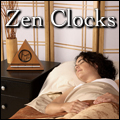 The Zen Alarm Clock transforms mornings, awakening you gradually with a series of gentle acoustic chimes Once you use a Zen Clock nothing else will do  The Zen Alarm Clock transforms mornings, awakening you gradually with a series of gentle acoustic chimes Once you use a Zen Clock nothing else will do Now & Zen – The Gentle Chime Alarm Clock & Timer Store
1638 Pearl Street
Boulder, CO 80302
(800) 779-6383
orders@now-zen.com
Posted in sleep, Sleep Habits
 The Zen Alarm Clock transforms mornings, awakening you gradually with a series of gentle acoustic chimes Once you use a Zen Clock nothing else will do Deep sleep can provide much needed rest after a difficult day, but a new study suggests it can also help decrease the emotional intensity of painful experiences.
Researchers at the University of California at Berkeley found that the more time spent in REM sleep, or the dream phase of sleep, may diminish the activity of stress-related chemicals in the brain.
“The dream stage of sleep, based on its unique neurochemical composition, provides us with a form of overnight therapy, a soothing balm that removes the sharp edges from the prior day’s emotional experiences,” said Matthew Walker, a co-author of the study and an associate professor of psychology and neuroscience at UC Berkeley in a statement.
Their findings, the authors said, could help explain why people who have with post-traumatic disorder experience recurring nightmares. One of the hallmarks of the disorder is less time spent in REM sleep. As a result, the researchers believe they don’t experience the same emotional blunting brought on by adequate REM sleep. REM sleep normally makes up about 20 percent of normal sleep hours.
In the study, 35 healthy adults were split into two groups. Each group looked at 150 emotional images two different times, 12 hours apart, and an MRI measured brain activity.
Half of the participants stayed awake between each viewing, and the other half got a full night’s in between each viewing.
Those who slept had a less emotional reaction the second time they looked at the images, and the MRI showed less activity in the amygdala, the emotion-processing part of the brain.
Tests that measure brain activity while the participants slept indicated decreased activity of stress-related chemicals, which had a calming effect.
 Wake up with gradual, beautiful acoustic chimes. The Zen Alarm Clock transforms your mornings and gets you started right, with a progressive awakening “We know that during REM sleep there is a sharp decrease in levels of norepinephrine, a brain chemical associated with stress,” Walker said. “By reprocessing previous emotional experiences in this neuro-chemically safe environment of low norepinephrine during REM sleep, we wake up the next day, and those experiences have been softened in their emotional strength. We feel better about them, we feel we can cope.”
Boulder, Colorado—an innovative company has taken one of life’s most unpleasant experiences (being startled awake by your alarm clock early Monday morning), and transformed it into something to actually look forward to. “The Zen Alarm Clock,” uses soothing acoustic chimes that awaken users gently and gradually, making waking up a real pleasure.
Rather than an artificial recorded sound played through a speaker, the Zen Clock features an alloy chime bar similar to a wind chime. When the clock’s alarm is triggered, its chime produces a long-resonating, beautiful acoustic tone reminiscent of a temple gong. Then, as the ring tone gradually fades away, the clock remains silent until it automatically strikes again three minutes later. The frequency of the chime strikes gradually increase over ten-minutes, eventually striking every five seconds, so they are guaranteed to wake up even the heaviest sleeper. This gentle, ten-minute “progressive awakening” leaves users feeling less groggy, and even helps with dream recall.
Now & Zen – The Soothing Alarm Clock Store
1638 Pearl Street
Boulder, CO 80302
(800) 779-6383
orders@now-zen.com
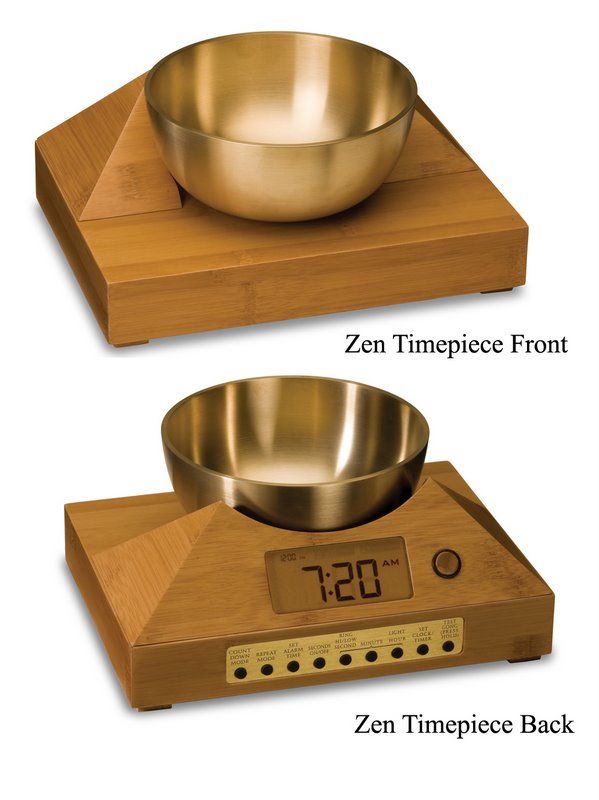 The Zen Alarm Clock transforms mornings, awakening you gradually with a series of gentle acoustic chimes Once you use a Zen Clock nothing else will do
Posted in Bamboo Chime Clocks, Dreams, sleep, Sleep Habits, wake up alarm clock, Well-being
« Previous Page — « Previous Entries
Next Entries » — Next Page »
|
|
|
|